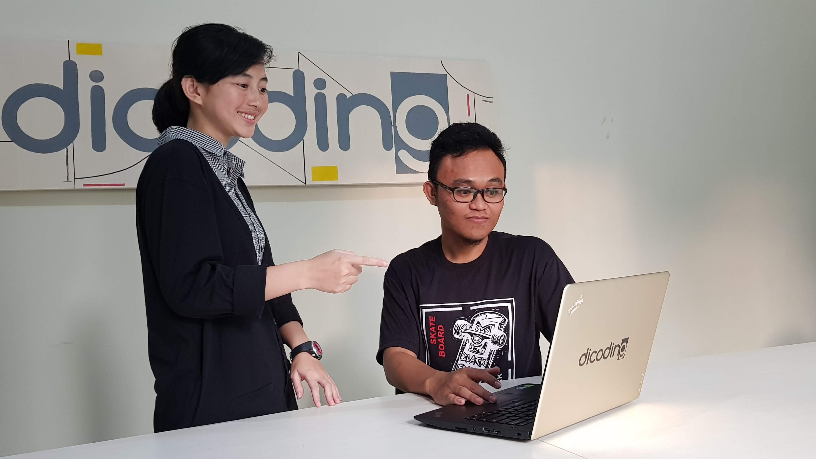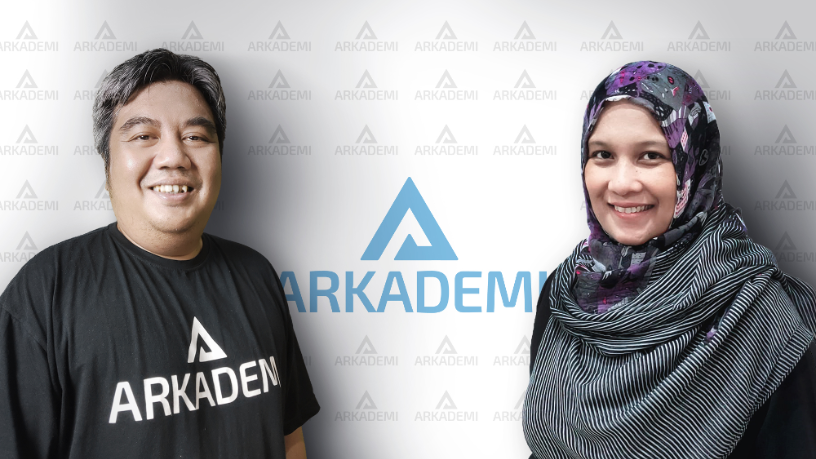Coding edtech platform Dicoding Indonesia hopes to produce more well-qualified tech professionals in a country marked by tech talent shortage. From their personal experiences in the field, the company's founders saw a large gap between what employers were seeking and the skill level developed by local educational institutions.
And so Narenda Wicaksono, Kevin Kurniawan and Akbar Hidayat aimed for Dicoding to connect tech-enthused Indonesians who wanted a career in the field and what they saw as a perpetually expanding market in dire need of quality tech professionals. Indeed a 2018 World Bank report projected that Indonesia is likely to experience a shortfall of 9m skilled digital professionals between 2015 and 2030.
''We are here to bridge that gap between Indonesian developers with the needs and demands of the market, which is getting more competitive everyday,'' Wicaksono, the company's CEO, says in an interview.
Wicaksono was previously a business development manager at Microsoft and Nokia. Kurniawan, the company's COO, worked at Nokia's developer experience department. CTO Hidayat was a freelance software developer. The company has about 30 employees.
So far, Dicoding has 240,000 members from over 450 Indonesian districts to its name. Dicoding's fees range from IDR 500,000 for 30 days' access to the whole syllabus, to slight discounts for every following month (IDR 900,000 for 60 days, IDR1.2m for 90 days and so forth). It currently offers six professional certifications: Android Developer, Front-end Web Developer, Cloud Developer (Google Cloud, Azure, and AWS), Game Developer via Unity Engine, Game Developer via Construct 2 Engine, and Augmented Reality / Virtual Reality Developer.
Kurniawan hopes that Dicoding will play a part in infusing digital skill-sets into the local work force.
“One of the most crucial issues in Indonesia, is that our [tech] work force does not have the relevant skill-sets to keep up with the needs of the times and the industry. Digital talent is sorely needed in Indonesia,” he says.
Promoting inclusiveness
Dicoding does not just act as an online-based educational platform (or as they dub it, ''Dicoding Academy'') but also has branches that focus on other needs. ''Jobs'' connects developers to companies; ''Events'' focuses on introducing developers to relevant networks; and ''Challenge'' involves competitions and scholarship opportunities.
Related to those challenges, in January and February, the Jakarta-based institution collaborated with the Indonesian government and French software company Alcatel-Lucent Enterprise (ALE) on ''ALE Geek Battle'', a competition in which participants must create an app utilizing ALE's Rainbow API, a cloud-based communication tool. The competition, which ended late last month, will reward the as-yet-unannounced winners with prizes including basic Android programming scholarship and opportunities to work at ALE.
The company wants to do even more than what is expected of a coding academy – that is, to play a part in promoting inclusiveness within the tech industry.
Wicaksono says that the aim is to promote a wider variety of tech professionals, “especially underprivileged ones such as the disabled.” They also want to help in providing opportunities for those who don't fit the mould of what the tech sector in Indonesia views as tech professionals, including women developers and programmers.
One of the ways Dicoding has done so is by presenting scholarships to people such as 25-year-old Junia Firdaus, who worked as a newspaper deliveryman before Dicoding provided him with the opportunity to learn about programming. Firdaus is now an Android engineer.
Another recipient of Dicoding's scholarship is 21-year-old Yusufano, who is deaf and survives by working menial jobs such as street parking attendant. Yusufano is now in Dicoding's Android Developer Expert class.
A growing market
One major reason for Dicoding's growth in the recent past is the extent to which coding, in particular, has become mainstream in Indonesia.
''The market has consistently grown in the past five years, I would say. The demography of our membership used to be dominated by university-age students and young professionals. These days we have junior-high age members, even those still 12 years of age, who are active and have accumulated quite impressive portfolios,'' says Wicaksono.
This growing interest is not only driven by the increasing market awareness of younger children and their parents, but also by dissatisfaction with the conventional education available.
''These kids are thirsty for skills that they just do not get at schools or online forums,'' Wicaksono adds.
According to Kurniawan, Indonesia suffers from a shortage of tech-professionals skilled in highly-specialized fields. He cites the lack of data scientists as an example, and the absence of any courses which specialize in that particular field in Indonesia. Dicoding offers training to be a data scientist, such as through their Python programming language training.
''It is a rare skill but the industry demand for it here is actually very high,'' adds Kurniawan.
Dicoding aims to provide a ''holistic, one stop hub for all (Indonesian) developers'', says Wicaksono.
The company is doing well business-wise, says Wicaksono, who declines to share any more details.
Short of teachers
Keeping up with the industry's demands is not easy; the biggest challenge comes with finding the right teaching talents. Wicaksono says that only a few universities in Indonesia offer education for aspiring teachers in the tech field.
Dicoding's curriculum is updated every week, the founders claim, to keep up with the industry's ever-changing nature. The materials Dicoding prepares are based on the ''checklist'' requirements of technology principals.
''So for example, when it comes to (learning about) Android tech, we partner with Google. And for Cloud, we partner with AWS, Azure, and Google Cloud. For those who want to learn about developing games, we partner with Unity. So our standards are based on the global industry needs,'' Wicaksono explains. Dicoding is also the sole Google Authorized Training Partner in Indonesia.
Dicoding does not depend on any outside funding and so far relies on its B2B partnerships (which includes Google, Microsoft and IBM) and the retail market, which means purchases through Dicoding's online store.
Kurniawan has a hefty goal for Dicoding: for it to become ''the greatest'' in terms of having impact on the local tech industry. They are developing more learning paths that Wicaksono says will cater to the industrial demands of contemporary times such as machine learning and iOs development.
''Innovation is a must,'' he stresses.
Dicoding students who have gone on to work at popular companies include Rui Fernando, 21, who now works as a programmer at the Indonesian unicorn Tokopedia, and Said Faisal, 22, who holds an Android Engineer position at the same company.
Kurniawan says, ''Our material is always updated with industry needs. We want Indonesian developers to be able to make useful digital products which hopefully could one day be a solution for global problems.''












